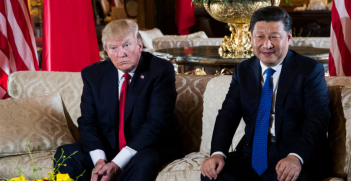The World as It Ought to Be: A Progressive Vision for American Foreign Policy

The purpose of American foreign policy in the world is atrophying and needs to be reinvigorated with a new singular vision.
I recently finished reading Ben Rhodes’ White House memoir, The World as It Is: Inside the Obama White House. It was personal, honest, and refrained from the memoiristic arts of partisan score-settling and reputational self-defence. Without the dogmatic certitude characteristic of the political memoir convention, Rhodes gave a diagnostic insight into the US foreign policy tradition: openly appreciating the limitations and doubting the mainstream assumptions behind American power. His meditations on the imperfections of the foreign policies he helped craft spotlighted the ambiguities and tangled knots of America’s relations abroad: that is, how “reality contributes to occasional schizophrenia.”
Behind his critical reflections of US foreign policy were a set of unapologetically idealist organising principles. Urged by a mentality to create “a movement that would remake the world order,” Rhodes conveyed his belief in the power of the Presidency and a progressive narrative to transform America’s relation to the rest of the world: “The arc of history.”
The World as It Is challenges an emerging trend in Trump-era foreign policy literature. This new wave of research and publication – stemming largely from the foreign policy expert community (“the blob”) – have done well to critically analyse the Trump administration’s contribution to the illiberal decay of international institutions, mistreatment of alliances, and the overall rudderless nature of post-2016 American strategic behaviour.
However, as much as it feels important to learn about the granular details of this strategic destruction wrought by Trump’s politics, the time has come to accept that in our current political milieu, such critical knowledge is not enough to dislodge the worst political leaders. Foreign policy analysts and commentators too frequently forget that for every alarming fact the public doesn’t know regarding the failures of Trump’s foreign policy, there are several that they do know, and simply don’t care about.
Proponents of American internationalism must go beyond an “out with the bad” approach to a vision for leadership of the international community. Without a new and clearly articulated meta-narrative for American global power, the attacks and criticisms on the current Trump administration’s policies, politics, and ideas will fail to shift public opinion.
Atrophying Support
Public opinion in both America and its allies is de-synchronised from shifts in Washington’s foreign policy. The future generational leaders of, and partners in American foreign policy have expressed their growing agitation with America’s expanding militarism and security footprint.
According to a public opinion survey conducted by the Chicago Council on Global Affairs, only 44 percent of American millennials qualify it as “very important” for the United States to maintain military dominance. Similar doubt has emerged in Australia. The 2019 Global Attitudes Survey conducted by Pew Research found that the Australian public ranks only sixth in the world for its level of US support, revealing a surprising lack of confidence for a treaty-bound “mateship”.Amongst Australian millennials, a growing scepticism sees only 38 percent of Australians under the age of 45 perceive the alliance as “very important,” according to the Lowy Institute poll.
The distance between public support and mainstream establishment thinking about foreign policy may be tragic, but it is understandable. Behind the domestic and transnational challenges that dominate the foreign policy bandwidths of regional powers in Asia, are post-9/11 popular imaginations of ‘global America’ that have taken on an uninspiring and nihilistic tone; animated by grainy helmet-cam footage of young GI’s fighting in Fallujah and redacted pages documenting torture and mass surveillance programs.
The Liberal Order and its Requiem
When millennial voters are presented with a choice between the Trumpian “America First” doctrine and the nebulous “rules-based liberal international order,” they may struggle to see a desirable philosophy for a 21st century American foreign policy.
Throughout the emergence of the post-post-Cold War multipolar international system, US administrations have repeatedly struggled to construct a compelling meta-narrative and overarching imagery for US foreign policy.
The Bush administration’s grand strategy battled with the “vision thing.” As Stephen Wertheim of Columbia University and the Quincy Institute argues, was more “grandeur” than “strategy,” singularly bad at “relating ends and means,” producing a strategic confusion manifested by America’s crash into the wars in the Middle East.
The Obama administration similarly failed to grasp a global blueprint for global America. While the “Pivot to Asia” presented a novel policy framework for strategic re-alignment, it lacked an overarching meta-story; failing to explain the ideological purpose of its policy prongs. In the words of Wertheim, the pivot represented a “prosaic posture in East Asia that neither guide[d] every action of the United States nor define[d] its existential purpose in the world”.
Immediately following Trump’s electoral victory, with mass reflexivity, mainstream foreign policy intellectuals rushed to the imperative of preserving the old “international order” under this new rogue presidency. The defence of the pre-Trump consensus was echoed by foreign policy experts in America’s allies and partners. Instead of embracing debate, reflection, and inquiry into the origins of the Trumpian worldview, foreign policy thinkers scrambled back to a pre-Trump politics as their organising principle and main countering device.
This use of the liberal order as an oppositional tool to pushback against Trump’s approach has been unproductive, and possibly dangerous. As Rebecca Lissner and Mira Rapp-Hooper recently discussed on War on the Rocks, at a practical policy level, when framed as a monolith, the liberal international order becomes more vulnerable and loses its durability for wear-and-tear pressures. It assumes fragility, disregards resilience, and invites easy criticism. Secondly, at a discursive level, the ‘liberal order’ attenuates the pluralism among US foreign policy internationalists, lumping them together into a “defensive crystalline monolithic” defined by its opposition to Trump. These assumptions hold back parts of public bodies from contributing to a rigorous debate and uncovering what the principles and guiding visions of American grand strategy going forward should be.
Strategic Competition
To be sure, Trump’s purpose for American force in the 21st century certainly has no embedded teleology; instead, mired in questionable interests via its parasitic attempts to extort allies and casting of blankets of doubt over international institutions.
While the framework of strategic competition outlined in the National Security Strategy (NSS) and National Defense Strategy (NDS) documents offers a new policy doctrine, it fails to engender a new spirit into US foreign policy.
Some have argued that a change in military posture and strategic approach may be necessary as a counter-weight to a rising China that continues to press its thumb on the balance of power. Efforts to distort global markets, oppress minorities, and weaken alliance structures are indeed legitimate stand-alone concerns. However, competition and the quest for strategic dominance is best and most productive when locked into a larger process of order-building and value espousal.
Therefore, without a new narrative and aspirational vision, it is erroneous to assume that such a hard and fast shift in China strategy is going to ignite the balancing alignments from allies and partners that Washington demands. Indeed, without this vision there won’t be a burden to share nor an endpoint to collectively act towards. An effective long-term response must go beyond new operational ideas and instead emerge from a broader whole-of-society conversation about the meaning and purpose of US global power. From this democratic act, a clearly articulated, positive vision for America can emerge.
The World as It Ought to Be
It may appear daunting and monumental to bring about a reimagination of America’s place in the world, but the task may be less a matter of invention than articulation. A new narrative loosely exists beneath the underbrush of Trump criticisms; a formula for bringing it out lies within the logic of outrage itself. Underneath the aghast is a sense of justice, mutual responsibility, and collective security. Vectors for new policy action are embryonic too, with young voters passionate to engage the world in ways that cooperate, especially around issues like climate change, peacebuilding, environmental protection, human rights, and inequality reduction.
Democrats and never-Trump Republicans frequently complain of the personalistic and at times outright corrupt sensibilities of the current administration’s approach to foreign policy. I also agree, but as the deleterious effects of the Trump White House infects further, it won’t be enough to reboot the old system. Instead, when a system failure occurs, someone has to reset and overhaul it. Someone has to propose the right way forward– a new ideal: as Rhodes put it, “the world as it ought to be.”
Toby Warden is a Bachelor of International and Global Studies student at the University of Sydney and currently completing his Honours on authoritarian warfighting. He can be followed on Twitter at @wobytarden
This article is published under a Creative Commons Licence and may be republished with attribution.





